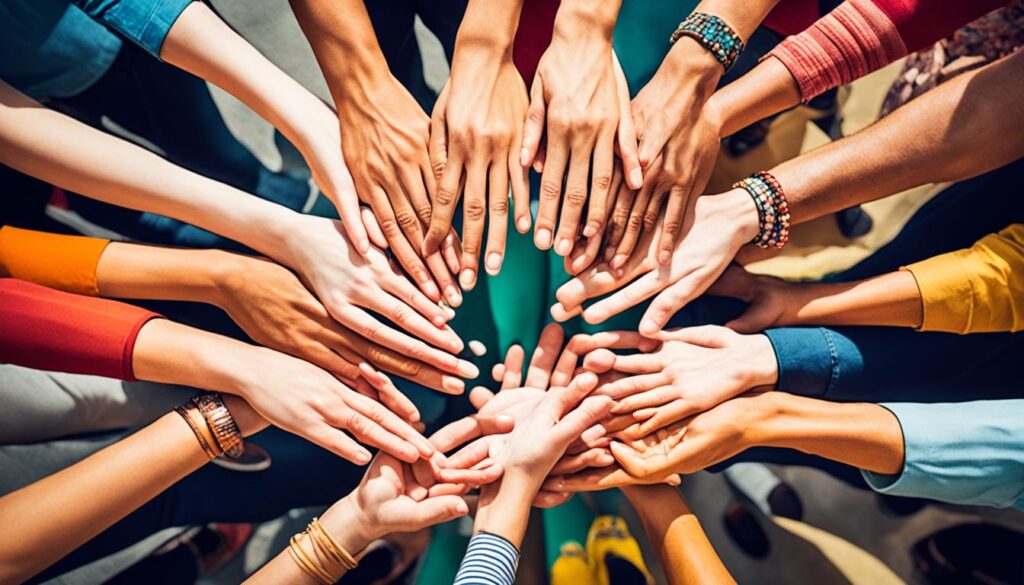“Thousands of candles can be lighted from a single candle, and the life of the candle will not be shortened. Happiness never decreases by being shared.” – Buddha
Have you ever wondered how you, as an individual, can make a positive impact on the world? The task may seem daunting in the face of global challenges, but the truth is that change begins with each one of us. By embracing the power of small actions and adopting strategies for global change, we can contribute to making the world a better place.
In this article, we will explore various ways you can improve the world and promote positive change in society. From sustainable development initiatives to community involvement tactics, we will delve into actionable ideas and methods that can help you become an agent of transformation. It’s time to unlock your potential and join the collective effort towards a better future.
Key Takeaways:
- By making small changes in your daily life, you can contribute to a more sustainable and positive future.
- Engaging in volunteer work and community involvement empowers you to create meaningful change in your society.
- Promoting sustainable development is essential for building a better world for future generations.
- Fostering empathy and understanding is crucial for achieving global harmony and unity.
- Your impact matters. Embrace your individual role and strive to make a difference in the world.
Mindfulness and Compassion in Buddhism: Insights for Personal and Societal Harmony
Buddhism’s impact goes beyond spirituality; it offers valuable teachings that can guide us in addressing modern challenges and fostering personal and societal harmony. At the core of Buddhism are the practices of mindfulness and compassion, which play a significant role in promoting a more harmonious world.
Practicing mindfulness involves cultivating awareness of our thoughts, emotions, and actions in the present moment. It allows us to observe our experiences without judgment and helps us develop a deeper understanding of ourselves and the world around us. By being fully present, we can make conscious choices that align with our values and contribute to personal growth.

Compassion, on the other hand, encourages us to extend kindness, empathy, and care towards others. It involves recognizing the interconnectedness of all beings and developing a genuine concern for their well-being. By cultivating compassion, we can break down barriers and foster a sense of unity and shared humanity.
Mindfulness and Compassion in Action
Addressing modern challenges such as stress, anxiety, and social disconnect can be achieved through the practice of mindfulness. By staying present and aware of our thoughts and emotions, we can better manage stress and cultivate a sense of inner peace. Mindfulness also helps us develop resilience and adaptability, enabling us to navigate life’s challenges with grace and clarity.
Compassion, when practiced systematically, can lead to positive social change. By extending kindness and empathy to others, we can nurture understanding and acceptance, bridging divides and promoting equality. Compassion inspires acts of benevolence and altruism, creating a ripple effect of positive impact in both personal and societal realms.
Contributing to a Better World
The insights derived from Buddhism’s mindfulness and compassion teachings can contribute to making the world a better place by promoting personal and societal harmony. By incorporating these principles into our daily lives, we can foster understanding, acceptance, and peaceful coexistence.
| Mindfulness Benefits | Compassion Benefits |
|---|---|
| Reduces stress and anxiety | Fosters empathy and kindness |
| Improves focus and concentration | Promotes interconnectedness and unity |
| Enhances self-awareness and emotional intelligence | Inspires acts of benevolence and social change |
By harnessing the power of mindfulness and compassion, we can cultivate personal well-being while contributing to the betterment of society. Embracing these principles enables us to navigate the complexities of the modern world with wisdom, empathy, and resilience.
Small Actions, Big Impact: Everyday Ways to Make a Difference
Making a difference in the world doesn’t always require grand gestures. In fact, small actions can have a significant impact when it comes to improving our society and the environment. By incorporating simple habits and practicing random acts of kindness, you can contribute to a more positive and sustainable future.
One way to make a difference is by adopting sustainable habits in your daily life. For example, recycling your waste, reducing your energy consumption, and choosing reusable products can help minimize your carbon footprint and promote environmental conservation. These small choices, when practiced consistently, can have a cumulative effect and contribute to a greener planet.
Another impactful way to make a difference is through random acts of kindness. Whether it’s offering a helping hand to a stranger, volunteering your time for a local charity, or simply spreading positivity through kind words or gestures, these small acts can bring joy and make a positive impact on someone’s day.
Moreover, by taking responsibility for your actions and making conscious choices, you can create a ripple effect of positive change that extends beyond your immediate surroundings. When others see your commitment to making a difference, they may be inspired to follow suit and contribute to the collective efforts of social impact and environmental conservation.
Here are a few examples of small actions that can have a big impact:
- Carrying a reusable water bottle and coffee cup to reduce single-use plastic waste.
- Turning off lights, appliances, and electronics when not in use to conserve energy.
- Participating in neighborhood clean-up campaigns to keep your community clean and beautiful.
- Supporting local businesses and fair trade products to promote economic sustainability.
- Donating unused items to charitable organizations instead of throwing them away.
Remember, it’s the collective effort of small actions that can lead to significant change. Each small step you take towards making a difference contributes to a better world. Start today and inspire others to join you on this journey of positive impact.

| Small Action | Impact |
|---|---|
| Practicing random acts of kindness | Spreads positivity and brightens someone’s day. |
| Adopting sustainable habits | Reduces environmental impact and promotes conservation. |
| Volunteering your time | Supports causes and organizations in need. |
| Being mindful of your actions | Encourages others to think consciously and make a positive impact. |
Volunteerism and Community Involvement: Empowering Change Together
Engaging in volunteer work and community involvement is a powerful way to make a positive impact on the world. By dedicating your time and skills to causes and organizations that align with your values, you can contribute to empowering change and creating a better society.
Volunteerism allows you to connect with others, address social issues, and work towards common goals, fostering a sense of collective responsibility and social progress. When you actively participate in community initiatives, you become a driving force for positive change, inspiring others to follow suit.
Benefits of Volunteerism and Community Involvement
1. Personal Growth and Skill Development: Volunteering offers opportunities for personal growth and skill development. Whether you’re honing your leadership abilities, improving communication skills, or learning new talents, volunteer work allows you to develop valuable qualities that can benefit both your personal and professional life.
2. Social Connection and Support: Engaging in community involvement provides an avenue for social connection and support. By working alongside like-minded individuals who share the same passion for creating positive change, you build meaningful relationships and create lasting bonds within your community.
3. Making a Difference: Volunteerism gives you the power to make a difference. Whether you’re helping those in need, contributing to environmental conservation, or advocating for social justice, your actions have a direct and tangible impact on those you’re assisting, as well as the broader society.
Examples of Volunteer Activities
1. Environmental Conservation: Get involved in local initiatives focused on preserving the environment through activities like tree planting, beach cleanups, or recycling drives. Take part in conservation efforts that protect and restore our natural ecosystems.
2. Youth Mentoring and Education: Volunteer as a mentor or tutor for disadvantaged youth, helping them develop essential skills and supporting their educational journey. Your guidance can empower them to overcome challenges and achieve their full potential.
3. Community Service: Contribute to community service projects such as food drives, clothing donations, or assisting vulnerable populations. Your efforts can provide much-needed assistance to individuals and families facing difficult circumstances.
Impact of Volunteerism on Society
Volunteerism plays a crucial role in addressing social issues and creating a more equitable society. When individuals come together to support local communities, they foster a sense of collective responsibility and inspire positive change. This shared commitment to social responsibility empowers marginalized groups, helps bridge societal gaps, and builds a stronger, more inclusive society.
| Benefits of Volunteerism and Community Involvement | Examples of Volunteer Activities | Impact of Volunteerism on Society |
|---|---|---|
|
| Volunteerism plays a crucial role in addressing social issues and creating a more equitable society. When individuals come together to support local communities, they foster a sense of collective responsibility and inspire positive change. This shared commitment to social responsibility empowers marginalized groups, helps bridge societal gaps, and builds a stronger, more inclusive society. |
Promoting Sustainable Development: Strategies for a Better Future
Sustainable development is crucial for creating a better future for our planet and humanity. By implementing strategies that prioritize environmental conservation, social equity, and economic viability, we can make a meaningful contribution to building a sustainable and thriving world.
One of the key strategies for promoting sustainable development is supporting renewable energy initiatives. By transitioning from fossil fuels to clean, renewable sources of energy such as solar and wind power, we can reduce our carbon footprint and mitigate the effects of climate change. Investing in renewable energy not only helps to combat global warming but also creates new job opportunities and stimulates economic growth.

Another important approach to sustainable development is advocating for fair trade practices. Fair trade ensures that producers in developing countries receive fair wages and are treated ethically, while also promoting sustainable agricultural practices. By supporting fair trade products, we can contribute to reducing poverty, protecting the environment, and improving the lives of marginalized communities.
Benefits of Sustainable Development
- Preserves natural resources for future generations
- Reduces greenhouse gas emissions and mitigates climate change
- Promotes social equality and economic stability
- Fosters innovation and technological advancements
- Enhances the quality of life for communities worldwide
To further promote sustainable development, it is essential to prioritize environmental conservation. By conserving natural habitats, protecting biodiversity, and implementing sustainable land-use practices, we can preserve the delicate balance of our ecosystems and ensure the availability of essential resources for future generations.
| Strategies for Promoting Sustainable Development | Benefits |
|---|---|
| Support renewable energy initiatives | Reduces dependence on fossil fuels, mitigates climate change, and stimulates economic growth |
| Advocate for fair trade practices | Improves lives of marginalized communities, protects the environment, and promotes sustainable agriculture |
| Prioritize environmental conservation | Preserves natural resources, protects biodiversity, and maintains ecosystem balance |
By adopting these strategies and incorporating sustainable practices into our daily lives, we can contribute to a better future for ourselves and future generations. Let us embrace the vision of sustainable development and work collectively to create a world that is environmentally conscious, socially just, and economically prosperous.
Fostering Empathy and Understanding: Key Ingredients for Global Harmony
Fostering empathy and understanding is crucial for achieving global harmony and making the world a better place. By cultivating a deep sense of compassion for others and striving to understand different perspectives and experiences, we can build bridges of connection and promote mutual respect. These qualities are essential in addressing social issues, resolving conflicts, and fostering a sense of unity and shared humanity.
In a world that often seems divided, empathy allows us to see beyond our own perspectives and tap into the experiences of others. It enables us to connect on a deeper level, recognize our shared struggles, and find common ground. Through empathy, we can break down barriers, challenge prejudices, and foster a more inclusive and understanding society.
Understanding is the key to unraveling the complexities of our world. It involves actively seeking knowledge, listening to diverse voices, and engaging in open dialogue. When we take the time to understand different cultures, beliefs, and experiences, we broaden our horizons and expand our capacity for empathy. This understanding helps us navigate the complexities of global issues and find innovative solutions that benefit all.
When empathy and understanding come together, they ignite a powerful force for change. They enable us to approach problems and conflicts with compassion, empathy, and a genuine desire to find mutually beneficial solutions. Whether it’s addressing social inequality, promoting environmental sustainability, or fostering peace, empathy and understanding play a vital role in creating a harmonious and just world.
The importance of fostering empathy and understanding cannot be overstated. It is through these qualities that we can transcend our differences, build bridges of connection, and create lasting change. By embracing empathy and understanding, we can work together to forge a path towards a more empathetic, compassionate, and harmonious world for all.

Conclusion
Making the world a better place is a responsibility that each of us carries. It starts with our individual actions and choices, which have the power to create a ripple effect of positive change. By implementing small changes in our daily lives, we can contribute to a better future for everyone.
Promoting sustainable development is essential in improving the world. By supporting initiatives that prioritize environmental conservation and social equity, we can work towards a more harmonious and thriving planet. Whether it’s adopting sustainable habits or advocating for renewable energy, every contribution adds up to a global impact.
Engaging in volunteer work and community involvement is another effective way to make a difference. By dedicating our time and skills to causes that align with our values, we contribute to empowering change and creating a better society. Together, we can address social issues, foster unity, and create positive social impact.
Fostering empathy and understanding is crucial in achieving global harmony. By cultivating compassion and striving to understand different perspectives, we can build bridges of connection and promote mutual respect. These qualities are integral to addressing conflicts, resolving differences, and working towards a world where everyone can thrive.
Remember, the power to make the world a better place lies within each of us. Let us embrace our individual roles and work together towards a brighter and more sustainable future for all. The impact we can create is limitless.
FAQ
How can we make the world a better place?
Making the world a better place is a collective effort that starts with each individual. By implementing small changes in our daily lives and adopting strategies for global change, we can contribute to making a positive impact. From practicing sustainability and engaging in volunteer work to fostering empathy and understanding, there are various ways we can improve the world and promote positive change in our society.
How can Buddhism’s teachings contribute to making the world a better place?
Buddhism offers valuable teachings that can guide us in addressing modern challenges and fostering personal and societal harmony. The practices of mindfulness and compassion play a significant role in Buddhism, encouraging individuals to cultivate awareness of their thoughts, emotions, and actions while also extending kindness and empathy towards others. These principles provide insights that can contribute to making the world a better place by promoting understanding, acceptance, and peaceful coexistence.
What are some everyday actions that can make a difference in improving the world?
Making a difference doesn’t always require grand gestures. Small actions can have a significant impact when it comes to improving the world. From practicing random acts of kindness to adopting sustainable habits like recycling and reducing waste, we can contribute to a more positive and sustainable future. By taking responsibility for our actions and making conscious choices, we can create a ripple effect of positive change that spreads beyond our immediate surroundings.
How can volunteerism and community involvement make a positive impact?
Engaging in volunteer work and community involvement is a powerful way to make a positive impact on the world. By dedicating our time and skills to causes and organizations that align with our values, we can contribute to empowering change and creating a better society. Volunteerism allows us to connect with others, address social issues, and work towards common goals, fostering a sense of collective responsibility and social progress.
What are some strategies for promoting sustainable development?
Sustainable development is essential for creating a better future for our planet and humanity. By implementing strategies that prioritize environmental conservation, social equity, and economic viability, we can contribute to building a sustainable and thriving world. From supporting renewable energy initiatives to advocating for fair trade practices, there are various ways we can promote sustainable development and work towards a brighter future.
How does fostering empathy and understanding contribute to making the world a better place?
Fostering empathy and understanding is crucial for achieving global harmony and making the world a better place. By cultivating a deep sense of compassion for others and striving to understand different perspectives and experiences, we can build bridges of connection and promote mutual respect. These qualities are essential in addressing social issues, resolving conflicts, and fostering a sense of unity and shared humanity.

